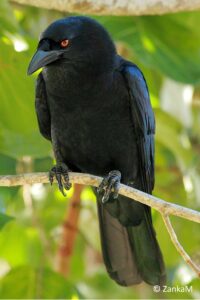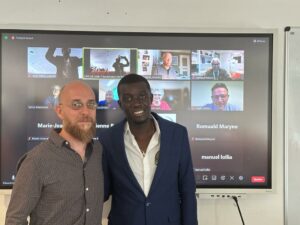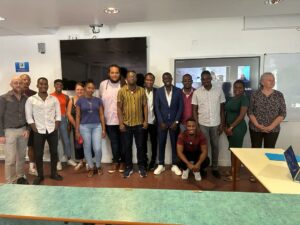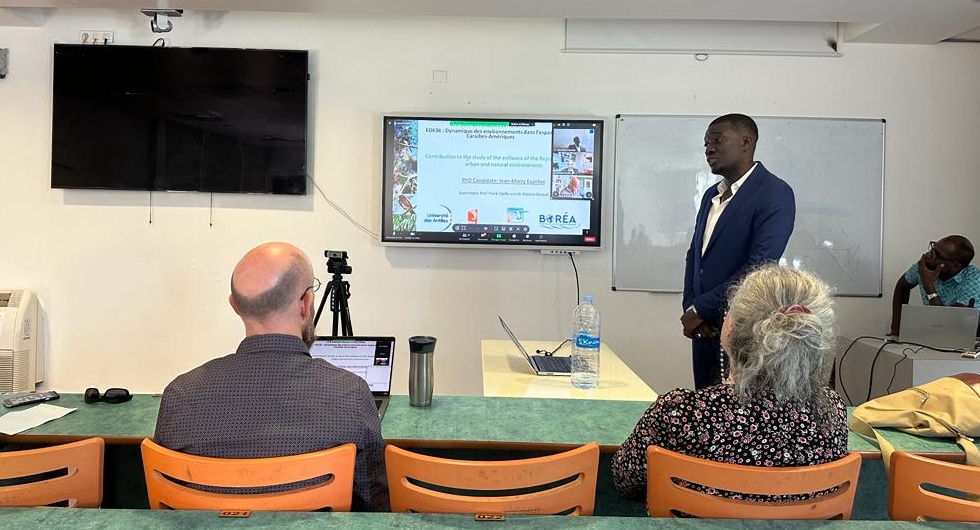A historic success for Haiti. Jean-Marry Exantus has just successfully defended his PhD thesis, the first in both conservation biology and ornithology in the country. Combining passion and tenacity, Jean-Marry Exantus proves that it is possible for Haitians to become involved in safeguarding their natural heritage by developing world-class scientific expertise in the study and conservation of biodiversity.
Wednesday October 25, 2023 will go down in the history of scientific research and biodiversity conservation in Haiti. On that day, Jean-Marry Exantus defended his PhD thesis at the Université des Antilles in Guadeloupe. In front of a wide audience, present on site or by videoconference, the student presented his work for 45 minutes, entitled “Contribution à l’étude de l’avifaune de la République d’Haïti en milieux urbain et naturel” (Contribution to the study of the avifauna of the Republic of Haiti in urban and natural environments), before answering questions for over two hours from the jury, made up of a panel of international researchers. The members of the jury were unanimous in underlining the exceptional quality of this thesis, attested by no less than five publications in international peer-reviewed journals – a real tour de force, well above the average scientific output for a doctoral thesis. It came as no surprise when, at the end of the oral, the jury awarded the candidate the title of Doctor of the Université des Antilles. It was a proud and moving moment for Jean-Marry and his family, but also for his supervisors, for the associations Caribaea Initiative and FOKAL that supported his work, and for his country as a whole.
Haiti – a country lacking local scientific experts

Hispaniolan Crow (Corvus leucognaphalus)
Haiti is home to unique ecosystems and endemic species, i.e. species found nowhere else on the planet. However, this biodiversity is threatened by many factors, such as intense deforestation, habitat loss, climate change and other growing anthropogenic pressures. Despite these threats, research into biodiversity and conservation remains extremely limited.
In this critical context, it is crucial to encourage and support the training of local researchers who are able to understand the specific issues related to biodiversity and conservation in Haiti. Their local perspectives and intimate knowledge of the country’s socio-environmental context are essential for identifying key issues and implementing appropriate conservation initiatives. In addition, research carried out by local researchers helps to create a sense of involvement and responsibility for biodiversity conservation, fostering a more holistic and sustainable approach to environmental conservation in the country.
A turning point for research in Haiti
Increasing local expertise in Haiti means overcoming a number of difficulties, in particular the lack of material, financial and human resources. For several years now, the Caribaea Initiative association has been supporting students and young researchers in the Caribbean, many of them from Haiti, in their university training and research projects. Funding, logistical support, mentoring by experienced researchers and inclusion in a local and international network: Caribaea Initiative is a springboard for young people involved in conservation research. Thanks to the association, 25 master’s students and 13 PhD students have been trained or are currently being trained. In Haiti, the five students supported by the association have already made significant contributions to biodiversity research: ground-breaking studies on endemic and threatened species, numerous scientific publications in leading international scientific journals, and even the discovery of a new species of fish in Lake Miragoâne.
Jean-Marry Exantus is the first Haitian student supported by the association to obtain his PhD, and he will soon be joined by two other Haitians currently completing their theses. For Jean-Marry, the title of Doctor, beyond the personal accomplishment and academic recognition, strengthens his determination to be a key player in protecting Haiti’s natural heritage. Far from being attracted by a position abroad, his primary objective remains to make the most of his skills within Haitian institutions. He also wants to encourage young Haitians to get involved in studying and protecting their country’s natural heritage. Let’s hope that the Haitian authorities and universities will soon welcome him, enabling him to put his expertise to good use in his native country.


Summary of his thesis
Haiti, one of the two countries occupying the island of Hispaniola, has a rich avian diversity, marked by a relatively high rate of endemism. However, this natural heritage is severely threatened by environmental degradation, mainly due to urbanization and deforestation. In addition, there is a critical lack of scientific data on Haiti’s avifauna, and almost all of the few studies carried out have been conducted in the wild.
Jean-Marry Exantus’s thesis provides important data on birdlife in Haiti, via two distinct lines of research. The first examines the urban avifauna of Port-au-Prince, revealing marked similarities between avian populations in forest and agroforest environments. In addition, the study of two protected sites in urban and suburban environments highlights significant differences in the composition of avian assemblages and underlines their complementarity. The study also revealed the presence, in urban sites, of two endemic Hispaniola species classified as vulnerable by the IUCN: the Hispaniolan Crow (Corvus leucognaphalus) and the Hispaniolan Amazon (Amazona ventralis).
The second line of research focuses on the study of avifauna in a natural forest environment, in a protected area. The use of various monitoring methods reveals the presence of numerous endemic species, but also a decline in the relative abundance of forest-dependent and insectivorous species over time. An in-depth analysis of the population of the La Selle Thrush (Turdus swalesi), an endemic and vulnerable bird, provides new insights into the species: diet, sexual dimorphism, parasites, survival rates…
These discoveries underline the crucial importance of conservation biology research in Haiti for the preservation of biodiversity and highlight the need for increased resources and support to continue these essential research efforts.

Jean-Marry’s academic career
Jean-Marry studied agricultural engineering at the Université Episcopale d’Haïti, specializing in natural resources and the environment. Enrolled in the Caribaea Initiative association’s training program in 2016, he obtained his master’s degree at the Université des Antilles (Guadeloupe), initiating his research on avian biodiversity around Port-au-Prince during his internship. Jean-Marry Exantus continued his PhD studies at the same university in 2018, under the supervision of Professor Frank Cézilly (Université de Bourgogne) and Dr. Etienne Bezault (Université des Antilles), with financial support from Caribaea Initiative and the FOKAL foundation.
Scientific publications
Scientific articles published in international peer-reviewed journals are an indispensable tool for sharing knowledge between researchers. During the course of his doctorate, Jean-Marry Exantus prepared an impressive number of five articles, several of which have already been published or accepted, while others are still in preparation.
- Exantus, J.-M., Beaune, D. & Cézilly, F. (2021). The relevance of urban agroforestry and urban remnant forest for avian diversity in a densely-populated developing country: The case of Port-au-Prince, Haiti. Urban Forestry & Urban Greening 63: 127217.
- Exantus, J.-M. & Cézilly, F. (2023). Composition of avian assemblage in a protected forested area in Haiti: Evidence for recent decline of both forest-dependent and insectivore species. Global Ecology and Conservation 46: e02607.
- Exantus, J.-M., Bezault, E., Cambrone, C. & Cézilly, F. (2023). Estimation of adult sex ratio and size related sexual dimorphism based on molecular sex determination in the vulnerable La Selle Thrush, Turdus swalesi. Animals 13: in press.
- Exantus, J.M., Vidal, A. & Cézilly F. (2023). Effects of deforestation on foraging behavior, ectoparasites, and adult survival in the vulnerable La Selle Thrush, Turdus swalesi, in Haiti. Sustainability, in prep.
- Exantus, J.M., Cambrone, C., Bezault, E. & Cézilly, F. (2023). Contrasted avian communities between two protected areas in the metropolitan area of Port-au-Prince, Haiti. Urban Ecosystems, in prep.
Media and press
- 2015 – Popular science article in Le Nouvelliste on the birds of Parc de Martissant : https://lenouvelliste.com/article/151811/inventaire-des-differentes-especes-doiseaux-sauvages-dans-le-parc-de-martissant
- 2018 – Jean-Marry’s video testimony at the end of his Master’s degree, before starting his thesis: https://youtu.be/umOofPpPbhk?si=N_IJN-7x88AcBhkc
- 2020 – Interview by Loop Haïti : https://haiti.loopnews.com/content/haiti-compte-31-especes-doiseaux-endemiques-dont-10-menacees
- 2021 – Radio Interview by Haiti Climat : https://soundcloud.com/user-268726113/haiti-climat-29-juillet-2021-invite?ref=clipboard&p=i&c=1&utm_source=clipboard&utm_medium=text&utm_campaign=social_sharing
- 2021 – Popular science article: “In Haiti, small urban green spaces provide refuges for birds” – https://www.caribaea.org/en/in-haiti-small-urban-green-spaces-provide-refuges-for-birds/
- 2023 – Popular science article: “Bird conservation in Haiti: a young researcher’s tenacity to assess the importance of protected forests” – https://www.caribaea.org/en/bird-conservation-in-haiti-a-young-researchers-tenacity-to-assess-the-importance-of-protected-forests/
- 2023 – Video testimony from Jean-Marry, a few weeks before his thesis defense: https://youtu.be/GvHyQgc6h6M?si=MMOdiuBTko69OGU4
- 2023 – Article on Jean-Marry’s defense in Guadeloupe la 1ère: https://la1ere.francetvinfo.fr/guadeloupe/these-jean-marry-exantus-zoome-sur-les-populations-d-oiseaux-endemiques-d-haiti-1439774.html
- 2023 – Television report broadcast in Guadeloupe la 1ère: https://youtu.be/ykQA_0R0oPc?si=WuItmE0BUfXOJgRN
- 2023 – Article in the haitian newspaper Le Nouvelliste: https://lenouvelliste.com/article/245265/jean-marry-exantus-devient-docteur-en-ecologie-grace-a-son-etude-sur-lavifaune-en-haiti
- 2023 – Article on the website of the FOKAL foundation: https://fokal.org/index.php/nouvel-fokal/31-nos-programmes/2095-la-soutenance-de-la-these-de-doctorat-de-jean-marry-exantus-2
- 2023 – Article in the Haitian newspaper Le National: https://lenational.org/post_article.php?soc=1158&fbclid=IwAR1W65b7G7-meLJF641K6EtbQ9CszZYvyVOHti67w3KBuKjyQ2flupokGm0
- 2023 – Article in the newspaper Loop Haiti: https://haiti.loopnews.com/content/un-haitien-docteur-en-biologie-de-la-conservation-et-en-ornithologie?fbclid=IwAR2liT6zP5lpdfLrx76akp3f7VoHdcrpuKoVqMHGQLt6g3H1UusyQKciqIE
- 2023 – Article in the newspaper Haiti Climat : https://haiticlimat.org/site/la-these-de-jean-marry-exantus-une-premiere-en-ecologie-urbaine-et-biologie-de-la-conservation-en-haiti/


